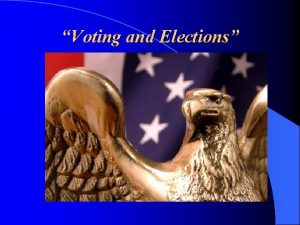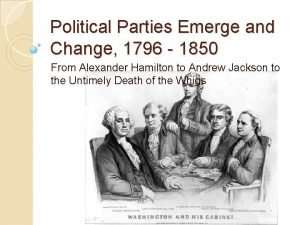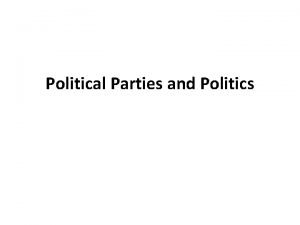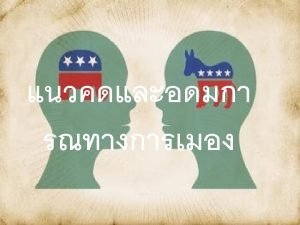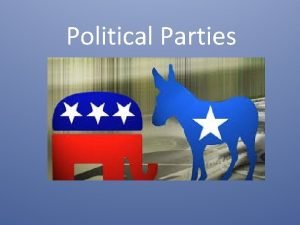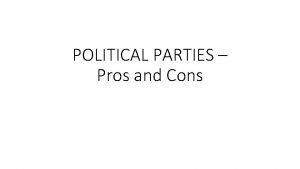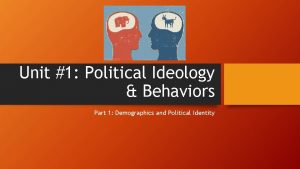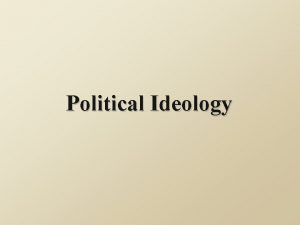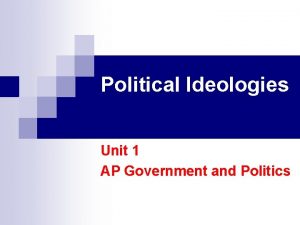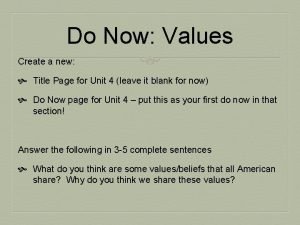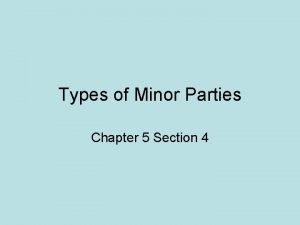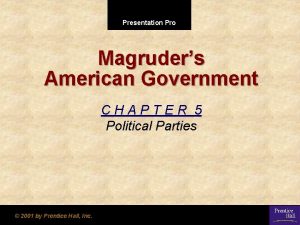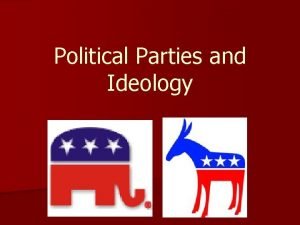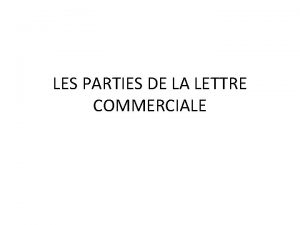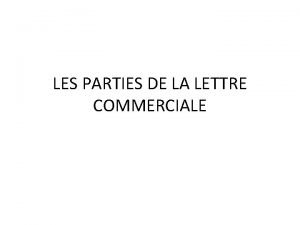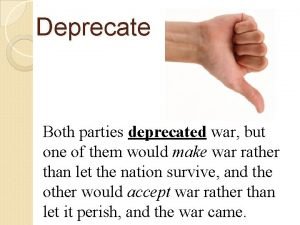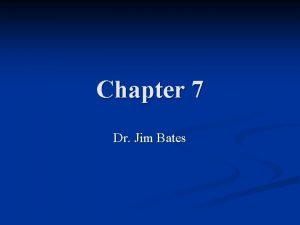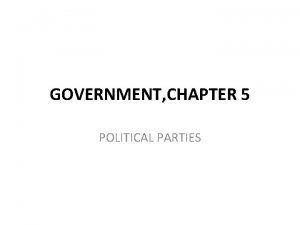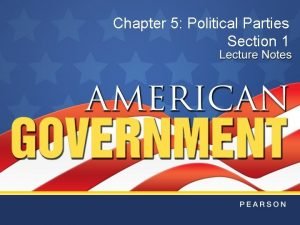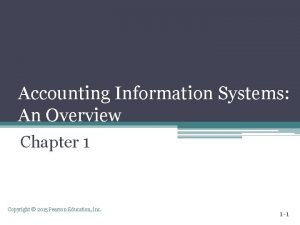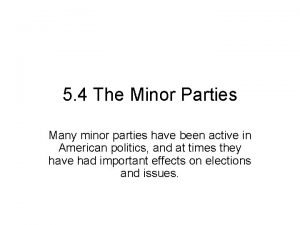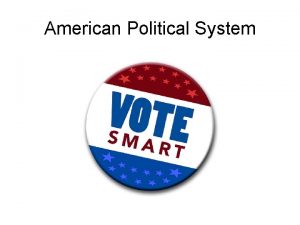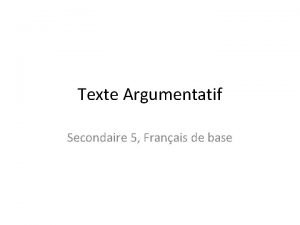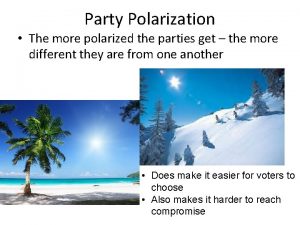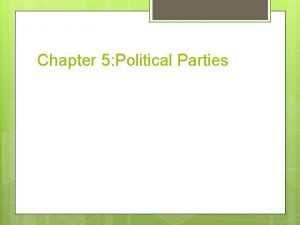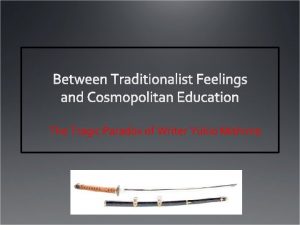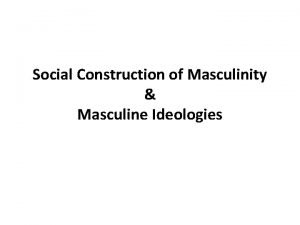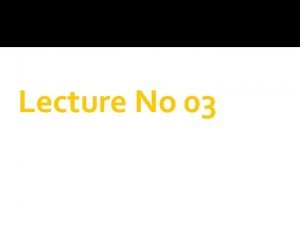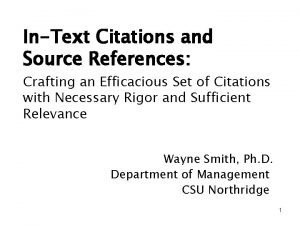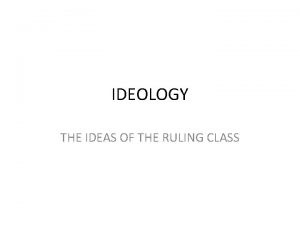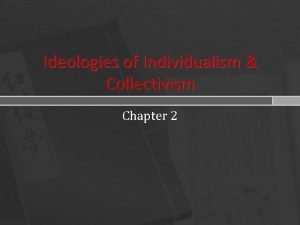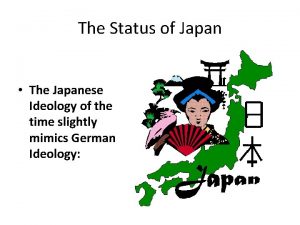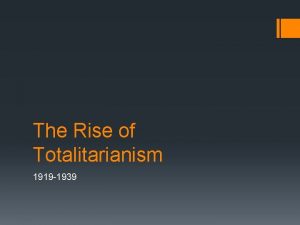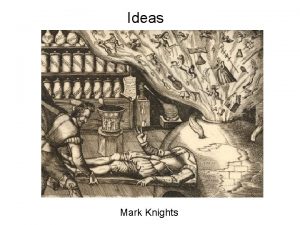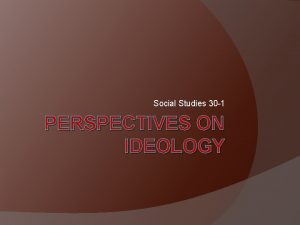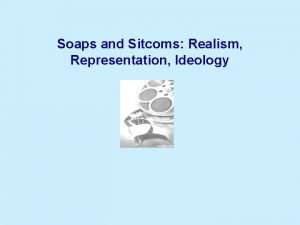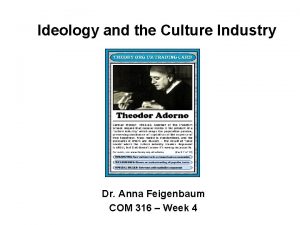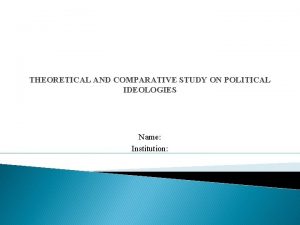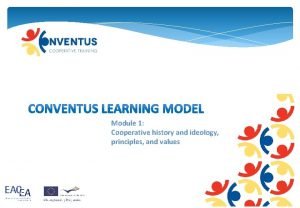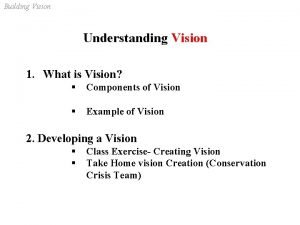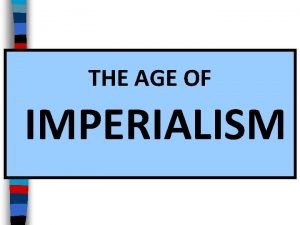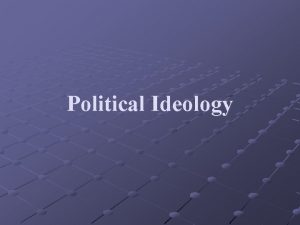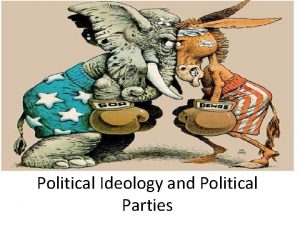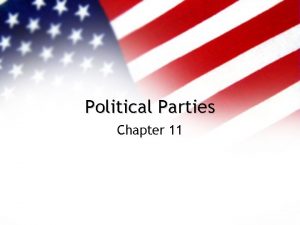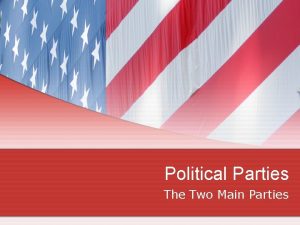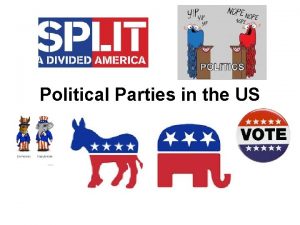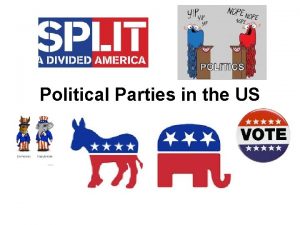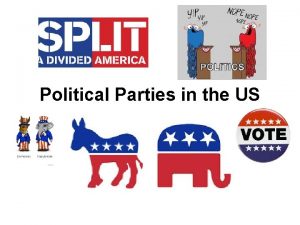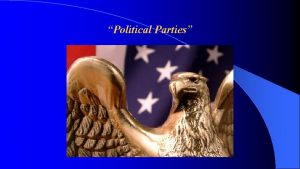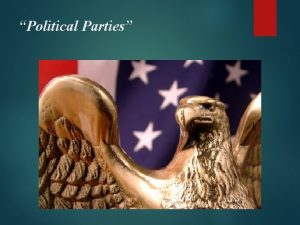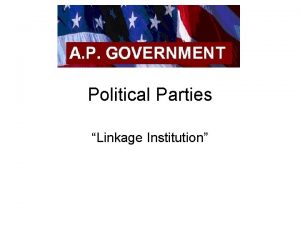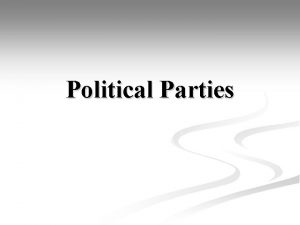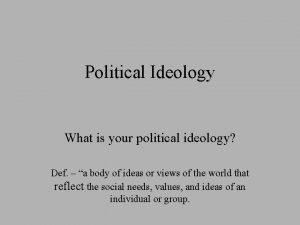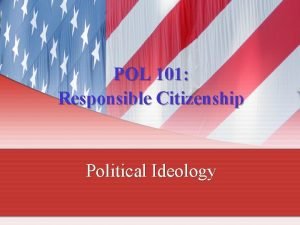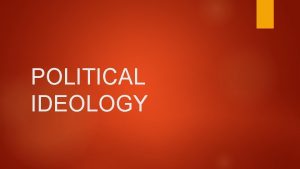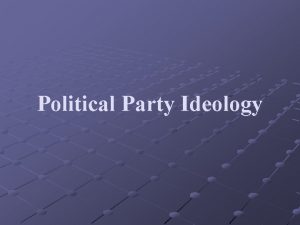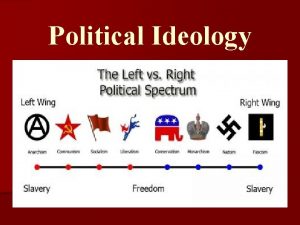Political Parties What is Your Ideology An ideology




































































- Slides: 68

Political Parties

What is Your Ideology? An ideology is a systematic set of values that enables a person to view policy issues in a consistent way. *READ EACH STATEMENT & MARK TRUE OR FALSE

1. The federal government places to many restrictions on the way corporations conduct their businesses.

2. Unions reduce productivity by discouraging workers from performing tasks not agreed to in a labor management contract.

3. High government taxes discourage citizens from working hard.

4. Most people on welfare would prefer a real job.

5. Government should create programs that will reduce America’s large number of poor people.

6. The best way to help the poor is to set policies that help businesses earn a profit so they can hire the underprivileged.

7. Taxes should be used to redistribute income by taking from the wealthy & giving to the poor.

8. The government has a special responsibility to protect & assist disadvantaged minorities.

9. Government programs on behalf of the disadvantaged discourage people from helping themselves.

10. America’s high crime rate is directly traceable to the persistence of poverty & discrimination.

11. America’s high crime rate is due to courts being too lenient with criminals.

12. Crime, unemployment, & poverty will be reduced if Americans return to the traditional values of hard work, self discipline, & belief in God.

13. Government should censor or restrict films & publications that undermine the nation’s moral fiber.

Determining Your Ideology… 1. 2. 3. 4. 5. 6. 7. 8. T= C, F=L T=C, F=L T=L, F=C 9. T=C, F=L 10. T=L, F=C 11. T=C, F=L 12. T=C, F=L 13. T=C, F=L

Political Ideologies Ideology: ■ Set of ideas/views reflecting social needs, values, & ideals ■ Maintained by a group or an individual ■ Consistent & coherent —predictable 3 Main Forms… 1. Liberal 2. Moderate 3. Conservative

Political Ideologies Liberal (Favor Government Involvement) Moderate (Opposed to Extreme Views) Conservative (Favor Traditional Values)

Terminology Review ■ Conservative: a person who doesn’t like change & who supports traditional, constitutional values ■ Liberal: a person whose political views are open to change & who supports government intervention in many areas of life. ■ Moderate: a person who doesn’t hold extreme political viewpoints & whose attitudes are between that of a conservative & a liberal

Political Ideologies & Political Parties ■ Political parties are concerned with winning elections ■ A person may have any of the 3 forms of political ideologies & be a member of either of the 2 major parties NOT ISSUE-BASED

Political Party Membership ■ Republicans tend to be conservative ■ Democrats tend to be liberal *Generalizations are risky ■ Independents aren’t loyal to either party (split-ticket voters)

Party Membership (*Statistically) Democrats ■ Women ■ African Americans ■ Latinos ■ Labor Union Members ■ Lower Income Groups Republicans ■ White Males ■ Asian Americans ■ Protestants ■ Business People ■ Middle to higher Income Groups

U. S. Political Parties ■ 2 -party system ❑ ❑ Democrats Republicans ■ Parties are instrumental in the administration of our government ■ Election-oriented NOT necessarily concerned with ideological foundation

POLITICAL PARTIES

REVIEW: Functions of Political Parties ■ Nominate candidates ■ Inform & activate voters ■ Provide a “seal of approval” ■ Govern ■ Act as a watchdog be sure candidates do the right thing

Why does the U. S. have a 2 -party system? ■ History ❑ ■ ■ Began with Federalists & Anti-Federalists Ideological Consensus ❑ Tradition ❑ ❑ Have always maintained 2 parties ■ Most people have similar feelings about broad issues No need for more than 2 parties Electoral System ❑ People don’t want to feel like they are “wasting” their votes

Other Political Options… One-Party & Multiparty Systems

One-Party Systems ■ Really a “no-party” system ■ Exist in nearly all dictatorships ■ Party of the ruling clique is the only party

Multiparty Systems ■ Exist in most European democracies ■ Usually based on particular interests ❑ ■ Economic class, religion, political ideology, etc. Tend to produce instability in government

Political Party Platforms

Terminology Review ■ Conservative: a person who doesn’t like change & supports traditional, constitutional views ■ Liberal: a person whose political views are open to change & who supports government intervention in many aspects of life. ■ Moderate: a person who doesn’t hold extreme political viewpoints & whose attitudes are inbetween.

Political Orientation Democrats ▪Usually more liberal Republicans ▪Usually more politically conservative ▪More concerned about government control & more ▪Believe in less government open to change control & more individual responsibility e of th any m e av h ave s h e i n t r e ing pa oft n i t H a u t T b b BO als, about o o g same nt ideas e differ them

What is a Party Platform? ■ Set of statements about what a candidate will do if elected ■ Statements of policy & promises

Taxes Democrats ▪Favor targeted tax cuts directed at lower income Americans ▪Higher taxes on middle to high incomes. Republicans ▪Favor broad-based tax cuts ge r o e , G 3 0 0 e 2 g a & s as 01 p 0 2 n o In x w a t h t s s u W. B the large ry to of s i 2 h f. o S. U n i cuts

Government Spending Democrats ▪Support larger federal spending programs administered from Washington Republicans ▪Favor reduced spending in the form of block grants to the states

Foreign Policy Democrats ▪Favor working through international organizations to combat terrorism ▪United Nations ▪NATO Republicans ▪Believe the U. S. has the right as a sovereign nation to act alone against threats ▪“Bush Doctrine” ▪Pre-emptive strikes when necessary

Abortion Democrats ▪Believe abortion should remain legal in all circumstances. Republicans ▪Believe unborn children have the right to life, liberty and pursuit of happiness & oppose abortion. ▪Pro-Choice ▪Pro-Life re a s n lica ile b u p Re wh e e t c i a ho der C o o m r are P d s e n r a lic ide b s u n tive p o a e c v r R se ife n L o c o r P as d e d r rega

Affirmative Action Democrats ▪Support the use of preferential treatment to achieve racial diversity Republicans ▪Oppose race-based quotas & set-asides ▪Support economic-based affirmative action

Social Security Reform Democrats ▪Oppose privatization & individual retirement accounts Republicans ▪Favor partially privatizing Social Security & the creation of individual retirement accounts ▪Oppose raising the age of retirement ▪Raise the age of retirement

Health Care ▪Democrats ▪Republicans ▪Support universal health- ▪Favor health maintenance care coverage guaranteed by organization reform & the federal government incremental coverage ▪Government money for medical research such as stem cell research rt o p p u ss e i t r a n p o i t H p i T r sc BO e r p g vin o r p m i its f e n e drug b ▪Promote health savings accounts ▪No government money for stem cell research

Education Democrats Republicans ▪Favor increased federal spending & control ▪Favor less federal spending & control ▪Early learning & individual attention ▪Raise academic standards ▪More charter schools ▪Better trained & paid teachers ▪More student aid & tax credits n a c i l pub e R e , th d to 5 9 9 t n In 1 ess trie e m rt a r p g e n D Co e h t sh i l o b a on i t a c u d E f o

Minimum Wage Democrats Republicans ▪Support regular increases in the ▪Oppose regular increases in the minimum wage on t n i m l u C m e i h n i t m g , n i n r to io 5 t Du 2 a. r t 4 $ is n i m m o r f t Ad n t e s w e e g r la wag e 8 h t n a — 5 $5. 1 se during a e r c n i iod r e p year minimum wage

Gay Marriage Democrats Republicans ▪Generally favor gay ▪Believe in traditional marriages, same-sex unions marriage (between one man & gay rights and one woman), oppose civil unions & gay rights

History of U. S. Political Parties

The Elephant & the Donkey ■ Thomas Nast ❑ ■ Elephant ❑ ❑ ■ Political Cartoonist Strong & noble Mighty Donkey ❑ ❑ Work horse Dependable & trustworthy

The 2 -Party System in American History ■ George Washington warned against “factions” in his Farewell Address ■ Political parties began during Washington’s administration & have become a force in elections ever since

Eras of Dominance ■ Between 1800 & today there have been 4 eras in which one party or the other has dominated national politics ■ Much of the current era has been marked by a split in party control of the White House & Congress

The Eras of Domination Democrats 1800 -1860 ■ Farmers, planters, debtors, pioneers ■ ■ ■ Opposed by Federalists, Whigs, & Republicans ■ ■ Thomas Jefferson James Madison James Monroe Andrew Jackson Martin Van Buren James K. Polk Franklin Pierce James Buchanan

The Eras of Domination Republicans 1860 -1932 ■ Supported by Northern & Western farmers, African Americans, & businessmen ■ Democrats controlled the South at this time ■ ■ ■ ■ Abraham Lincoln Andrew Johnson Ulysses S. Grant Rutherford B. Hayes James A. Garfield Chester Arthur Benjamin Harrison William Mc. Kinley Teddy Roosevelt William Taft Warren G. Harding Calvin Coolidge Herbert Hoover

The Eras of Domination Democrats 1932 -1968 ■ Supported by Southerners, small farmers, organized labor, minorities, & big cities ■ Led by FDR’s New Deal gov’t. following the Great Depression ■ ■ FDR Harry S. Truman JFK Lyndon B. Johnson

The Eras of Domination New Era: Divided 1968 - Now ■ Republicans have dominated the White House ■ ■ ■ Democrats have controlled Congress Divided government ■ ■ Richard Nixon Gerald Ford James Carter Ronald Reagan George H. W. Bush Bill Clinton George W. Bush Barack Obama

The Minor Parties

Minor Parties ■ AKA “Third Parties” ■ Introduce useful innovations in American politics ■ Unlike major parties, tend to take clear-cut stands on controversial issues

The Role of Minor Parties ■ “Spoiler” ❑ ■ Critic ❑ ■ Can potentially cost a major party candidate the election Speak out against the actions of the major parties Reformer/Innovator ❑ Propose ideas that are sometimes adopted by the major parties

The Short Life Span of Minor Parties ■ Discouraged by major parties ■ Difficulty qualifying for the ballot in some states—limits their growth ■ Difficulty setting up national & state organization ■ Electoral System favors major parties ❑ ■ Winner-take-all Issues are often absorbed by major parties

4 Types of Minor Parties ■ ■ Ideological Single-Issue Economic Protest Splinter

TYPES OF MINOR PARTIES

Ideological Parties ■ Based on a set of beliefs (an ideology) Economic ❑ Social ❑ Political ❑

Ideological Parties ■ Most have been built on Karl Marx’s ideas (Marxist thought) ■ Socialist Party Socialist Labor Party Communist Party ■ ■

Ideological Parties ■ Sometimes centered on emphasizing personal freedom ■ Libertarian Party Black Panther Party ■

Ideological Parties ■ Don’t often win elections ■ Longest-lived type of minor party ❑ Ideologies are consistent—don’t change!

Single-Issue Parties ■ ■ ■ Focus on one-issue Usually take name from that issue Right to Life Party Prohibition Party Marijuana Party

Single-Issue Parties ■ ■ ■ Very-short life span Die after issue fades or interest in issue ends Sometimes major parties take on key issues

Economic Protest Parties ■ Appear during tough financial times ■ Appeal to those that are angry about money issues ■ Reform Party Working Families Party Populist Party Greenback Party ■ ■ ■

Economic Protest Parties ■ Demand better conditions from major parties ■ Short life span ❑ Disappear when things improve economically

Splinter Parties ■ Parties that have broken away from one of the major parties

Splinter Parties ■ ■ ■ Usually led by strong leader who didn’t get the major party’s nomination Dixiecrats (Henry Wallace) Bull Moose (Teddy Roosevelt)

Splinter Parties ■ Short life span ■ Fade & collapse when the leader steps aside
 Brainpop political parties
Brainpop political parties What was one way progressives differed from populists
What was one way progressives differed from populists Political parties
Political parties The supreme court change
The supreme court change Political parties
Political parties Soup and ideology
Soup and ideology Political parties
Political parties Political parties pros and cons
Political parties pros and cons Political ideology ap government
Political ideology ap government Whats political ideology
Whats political ideology Political ideology
Political ideology Political ideology definition
Political ideology definition Political spectrum diagram
Political spectrum diagram Political ideology
Political ideology What is ideology
What is ideology Give us your hungry your tired your poor
Give us your hungry your tired your poor Chapter 5 section 4 the minor parties
Chapter 5 section 4 the minor parties Creative writing on a birthday party
Creative writing on a birthday party Chapter 5 section 1 parties and what they do
Chapter 5 section 1 parties and what they do Self-announcement definition
Self-announcement definition Food themes for parties
Food themes for parties Les différentes parties de la lettre commerciale
Les différentes parties de la lettre commerciale Les parties de la lettre commerciale
Les parties de la lettre commerciale Que mangent les dauphins
Que mangent les dauphins Iso 14001 swot analysis example
Iso 14001 swot analysis example Deprecate in a sentence
Deprecate in a sentence Dear interested parties
Dear interested parties Microscope optique
Microscope optique Why does gatsby stop giving parties
Why does gatsby stop giving parties The smallest unit of election administration
The smallest unit of election administration Sarah and pam often go to parties
Sarah and pam often go to parties Les parties du texte narratif
Les parties du texte narratif Chapter 5 section 1 parties and what they do
Chapter 5 section 1 parties and what they do Interactions between ais and internal and external parties
Interactions between ais and internal and external parties 4 types of minor parties
4 types of minor parties Socialist parties
Socialist parties Sujet divisé exemple texte argumentatif
Sujet divisé exemple texte argumentatif Parties labyrinthicus
Parties labyrinthicus Comparaison entre cellule animale et végétale
Comparaison entre cellule animale et végétale American literature jeopardy
American literature jeopardy Power point parties
Power point parties Horses hate surprise parties
Horses hate surprise parties What does the graph indicate?
What does the graph indicate? Schéma installation fibre optique maison individuelle
Schéma installation fibre optique maison individuelle Splinter parties definition
Splinter parties definition Yukio mishima body
Yukio mishima body Discourse ideology
Discourse ideology Masculinity ideology
Masculinity ideology Significance of ideology
Significance of ideology Difference between theory and ideology
Difference between theory and ideology The ruling class definition
The ruling class definition Importance of ideology
Importance of ideology Ideology definition
Ideology definition Economic equality
Economic equality Gothic in extremo
Gothic in extremo Examples of individualism
Examples of individualism Japanese ideology
Japanese ideology Hitler ideology
Hitler ideology Ideology
Ideology Machiavelli ideology
Machiavelli ideology Perspectives on ideology
Perspectives on ideology Idealism to realism
Idealism to realism Horkeimer
Horkeimer Ideology
Ideology Cooperative ideology
Cooperative ideology Ideology
Ideology Sony mission statement 1950
Sony mission statement 1950 Marxist ideology
Marxist ideology Imperialism
Imperialism
